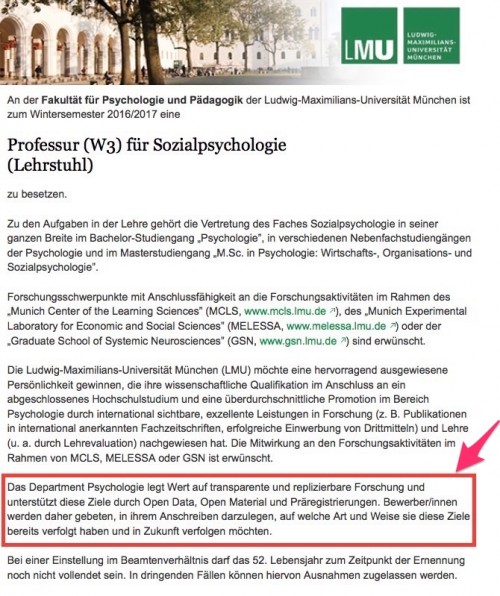Engaging in open science practices increases knowledge as a common good, and ensures the reproducibility, verifiability and credibility of research. But some have the fear that on an individual strategic level (in particular from an early career perspective) engaging in research transparency could reduce a researcher’s chance to get a tenured position in academia.
University hiring decisions often are driven (amongst other criteria) by publication quantity and journal prestige: “Several universities base promotion decisions on threshold h-index values and on the number of articles in ‘high-impact’ journals” (Hicks, Wouters, Waltman, de Rijcke, & Rafols, 2015), and Nosek, Spies, & Motyl (2012) mention “[…] the prevailing perception that publication numbers and journal prestige are the key drivers for professional success”.
We all know where this focus on pure quantity and too-perfect results led us: “In a world where researchers are rewarded for how many papers they publish, this can lead to a decrease in the truth value of our shared knowledge” (Nelson, Simmons, & Simonsohn, 2012), which can be seen in ongoing debates about low replication rates in psychology, medicine, or economics.
Doing studies with high statistical power, preparing open data, and trying to publish realistic results that are not hacked to (unrealistic) perfection will slow down scientists. Researchers engaging in these good research practices probably will have a smaller quantity of publications, and if that is the major selection criterion, they have a disadvantage in a competitive job market for tenured positions.
For this reason, hiring standards have to change as well towards a valuation of research transparency, and the department of psychology at LMU München did the first step into this direction.
Based on a suggestion of our Open Science Committee, the department added a paragraph to a professorship job advertisement which asks for an open science statement from the candidates:

(see also here).
Here’s a translation of the open science paragraph:
Our department embraces the values of open science and strives for replicable and reproducible research. For this goal we support transparent research with open data, open material, and pre-registrations. Candidates are asked to describe in what way they already pursued and plan to pursue these goals.
This paragraph clearly communicates open science as a core value of our department. Of course, criteria of research transparency will not be the only criteria of evaluation for candidates. But, to my knowledge, this is the first time that they are explicit criteria.
Jean-Claude Burgelman (Directorate General for Research and Innovation of the European Commission) says that “the career system has to gratify open science”. I hope that many more universities will follow the LMU’s lead with an explicit commitment to open science in their hiring practices.
Update 2021: We maintain a list of academic job offers that mention open science here. Be inspired!

9 thoughts on “Changing hiring practices towards research transparency: The first open science statement in a professorship advertisement”